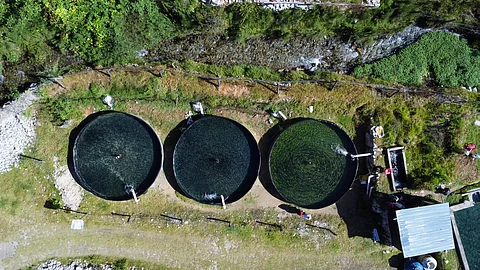

Produce stated that, with this regulatory change, Peru reaffirms its commitment to "intelligent environmental management."
Photo: Produce.
Peru's Government has approved a decree amending the Environmental Management Regulation for the Fishing and Aquaculture Subsectors, removing red tape in both sectors, a significant decision for their sustainable development.
Prepared by the Ministry of Production (Produce) in coordination with the Ministry of the Environment (MINAM) - with technical support from specialists in the public and private sectors - this update responds to the need for an efficient regulatory framework that is coordinated with the National Environmental Impact Assessment System (SEIA), allowing for the promotion of investment without compromising the sustainability of aquatic ecosystems.
By establishing a more agile, technical framework adapted to the productive dynamism of the sector, the new regulation introduces substantial improvements in environmental management for the fishing and aquaculture sector, optimizes environmental assessment procedures by reducing burdens and deadlines, and incorporates expedited mechanisms for responding to emergencies.
"Overall, the standard consolidates a more coherent regulatory environment geared toward sustainable and responsible production," Produce stated in the release announcing the change.
The Peruvian Vice Minister of Fisheries and Aquaculture, Jesús Barrientos, talked in the same vein. "This regulatory reform removes unnecessary barriers, strengthens oversight, and creates conditions for private investment to develop responsibly and sustainably," he said.
"The new regulation not only improves administrative efficiency, but also promotes a culture of environmental compliance based on prevention, transparency, and shared responsibility. It is a fundamental tool for consolidating competitive fisheries and aquaculture that are aligned with the challenges of climate change," Barrientos concluded.
The Peruvian Government emphasized that the new regulations on fishing and aquaculture will improve administrative efficiency.
Photo: Produce.
Regarding the advances included in the new regulation, the Peruvian Ministry of Production highlighted, first and foremost, the simplification of procedures for projects on public, communal, or shared-ownership sites, eliminating requirements that did not contribute to environmental value.
Produce also pointed out the drive to decarbonize the fishing sector, prioritizing the use of renewable energies and less harmful fuels in industrial fishing processing plants. In addition, facilities will be offered for the environmental formalization of expanded or modified activities without prior evaluation, granting two years to regularize without penalties, through the presentation of an Environmental Adaptation and Management Program (PAMA).
Likewise, the new regulation has also introduced criteria for the integration of environmental management instruments for aquaculture licenses located in the same area, allowing environmental commitments to be consolidated into a single file, using a complementary and efficient approach.
The regulation also includes the incorporation of expedited mechanisms to address environmental emergencies, allowing for a rapid and coordinated response to events that affect public health or the ecosystem.
Finally, Produce highlighted the implementation of a more agile and predictable operational framework, establishing actions that do not require modifying the environmental management instrument, which promotes investment without reducing environmental standards or generating unnecessary burdens.
The note from the Ministry of Production also said that the amended Environmental Management Regulation for the Fishing and Aquaculture Subsectors will be implemented using the institutional budget, without generating additional expenses for the country's budget, and its dissemination will be carried out by the General Directorate of Environmental Affairs for Fisheries and Aquaculture of Peru (DGAAMPA), through outreach events.
Produce concluded its statement by asserting that with this measure, "Peru reaffirms its commitment to intelligent environmental management that protects hydrobiological resources, promotes innovation, and strengthens governance in one of the most strategic sectors for the country's economic and social development."
Peru, which has just approved its first fisheries policy, was recognized a year ago as the country with the best fisheries performance in South America. This was according to an index by Yale and Columbia Universities, which pointed to the management of its anchovy stock - for which Produce always follows the scientific recommendations of the Peruvian Sea Institute (Imarpe), and which are mainly used for the production of fishmeal and fish oil - as the main reason for its success.
